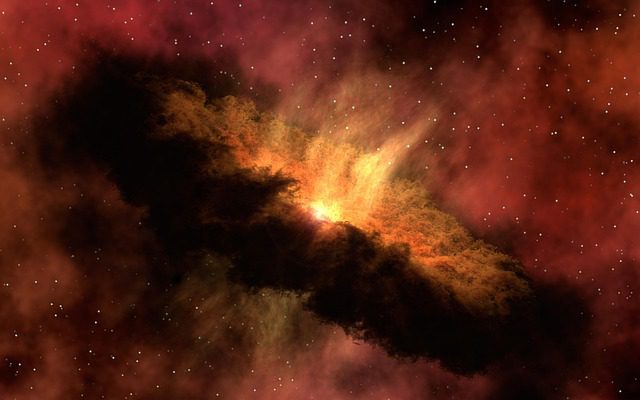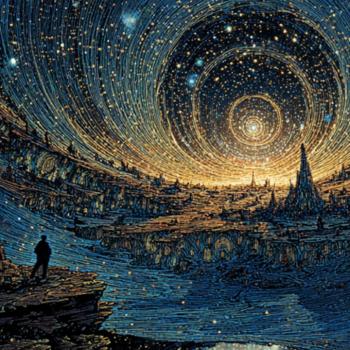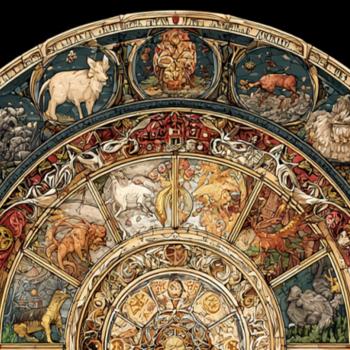
If we’re not here to observe the Universe, does it cease to exist?
What if Christ in us is what created the Universe, and it holds together because we are here to observe it?
“Now do you believe that I am in you and you are in me and we are in Him?”
What am I talking about?
Well, honestly, I’m not sure. But I think it all starts with this:
“One of the most bizarre premises of quantum theory, which has long fascinated philosophers and physicists alike, states that by the very act of watching, the observer affects the observed reality.
“In a study reported in the February 26 issue of Nature (Vol. 391, pp. 871-874), researchers at the Weizmann Institute of Science…conducted a highly controlled experiment demonstrating how a beam of electrons is affected by the act of being observed.
“The experiment revealed that the greater the amount of “watching,” the greater the observer’s influence on what actually takes place.”
“When a quantum “observer” is watching Quantum mechanics states that particles can also behave as waves. This can be true for electrons at the submicron level, i.e., at distances measuring less than one micron, or one-thousandth of a millimeter. When behaving as waves, they can simultaneously pass through several openings in a barrier and then meet again at the other side of the barrier. This “meeting” is known as interference.
“Strange as it may sound, interference can only occur when no one is watching. Once an observer begins to watch the particles going through the openings, the picture changes dramatically: if a particle can be seen going through one opening, then it’s clear it didn’t go through another.
“In other words, when under observation, electrons are being “forced” to behave like particles and not like waves. Thus the mere act of observation affects the experimental findings.”
Now, I’m not a scientist. But reading this makes me want to ask a few questions, like:
- What is it about the observation that changes the behavior of the electron?
- Does this phenomenon only occur with electrons [and photons]?
- What if the observe is blind, does the photon still behave like a particle?
- In other words, is it our eyes that somehow influence the way photons behave? Would a blind observer or someone present or near to the experiment, but not really paying close attention, still impact the photon the same way?
- Could it be that humans give off a low-level magnetic energy [or some other energy] that impacts the way the photons and electrons behave?
Note: Those last three questions are already answered by the original article. Apparently the “observer” isn’t human but is “a tiny yet sophisticated electronic detector that can spot passing electrons.”
Still, I wonder why observation impacts the electron. How does it know we’re watching?
Scientists who study Quantum Mechanics are equally confused by these questions:
“When this “observer effect” was first noticed by the early pioneers of quantum theory, they were deeply troubled. It seemed to undermine the basic assumption behind all science: that there is an objective world out there, irrespective of us. If the way the world behaves depends on how – or if – we look at it, what can “reality” really mean?
“The physicist Pascual Jordan, who worked with quantum guru Niels Bohr in Copenhagen in the 1920s, put it like this: “Observations not only disturb what has to be measured, they produce it… We compel [a quantum particle] to assume a definite position.” In other words, Jordan said, “we ourselves produce the results of measurements.”
“If that is so, objective reality seems to go out of the window.”
“If nature seems to be changing its behavior depending on whether we “look” or not, we could try to trick it into showing its hand. To do so, we could measure which path a particle took through the double slits, but only after it has passed through them. By then, it ought to have “decided” whether to take one path or both.
“An experiment for doing this was proposed in the 1970s by the American physicist John Wheeler, and this “delayed choice” experiment was performed in the following decade.
“It turns out that, just as Bohr confidently predicted, it makes no difference whether we delay the measurement or not. As long as we measure the photon’s path before its arrival at a detector is finally registered, we lose all interference.
“It is as if nature “knows” not just if we are looking, but if we are planning to look.”
Seriously. What?!
Now, so far these experiments have only been done [as far as I know] using photons and electrons. It could be that these phenomena are only present in these elements. In other words, it’s not that all of reality is this creepy, just the photon/electron family.
But, maybe not.
“To this day, physicists do not agree on the best way to interpret these quantum experiments, and to some extent what you make of them is (at the moment) up to you. But one way or another, it is hard to avoid the implication that consciousness and quantum mechanics are somehow linked.
“[American physicist John] Wheeler even entertained the thought that the presence of living beings, which are capable of “noticing”, has transformed what was previously a multitude of possible quantum pasts into one concrete history.
“In this sense, Wheeler said, we become participants in the evolution of the Universe since its very beginning. In his words, we live in a “participatory universe.””
All of this was inspired by a comment a friend of mine made the other day. He said:
“Quantum Mechanics says all reality is a relationship between the observer and the observed.
Without the observer, the cosmos disappears.”
So, after I thought about this for a moment I started to wonder if we need to be here so that the universe holds together.
Yes, where have I heard something like this before? Oh yeah:
“For in him [Christ] all things were created: things in heaven and on earth, visible and invisible, whether thrones or powers or rulers or authorities; all things have been created through him and for him. He is before all things, and in him all things hold together. “
So, Christ created all things – the known universe – and Christ holds all things together, but what if all things hold together because we are in Christ and we are observing what Christ has created?
Christ created everything, but, without an observer, the cosmos disappears.
Now, try to follow me here:
Christ is in the Father, and we are in Christ, and the Father is in Christ, and in us.
“On that day you will know that I am in My Father, and you are in Me, and I am in you.” (John 14:20)
“that all of them may be one, as You, Father, are in Me, and I am in You. May they also be in Us, so that the world may believe that You sent Me.” (John 17:21)
“I in them and You in Me–that they may be perfectly united, so that the world may know that You sent Me and have loved them just as You have loved Me.” (John 17:23)
So, Christ created all of reality. We are the creation. Yet, when we observe the creation, we make it real; we hold it all together, even as Christ does, because we are participating with Him in experiencing and observing reality.
“We are living in a participatory universe,” the Physicist said.
“If you abide in me, I will abide in you,” Jesus said. “Without me, you can do nothing, but if you remain in me you will bear much fruit.”
Participation is essential.
What do you think?
**
Keith Giles’s new book “Jesus Unbound: Liberating the Word of God from the Bible”, is available now on Amazon and features a Foreword by author Brian Zahnd.
JOIN ME IN BIRMINGHAM, ALABAMA: Sept. 15 at “Proactive Love: How Loving Our Enemies Changes Everything”. Register HERE>
I also co-host the Heretic Happy Hour Podcast on iTunes and Podbean and I live in Orange, CA with my wife of 28 years and our two sons.
BONUS: Unlock exclusive content including unique blog articles, short stories, free music, podcasts, videos and more on my Patreon page.













